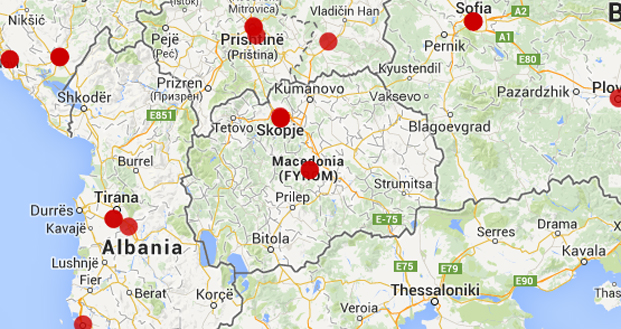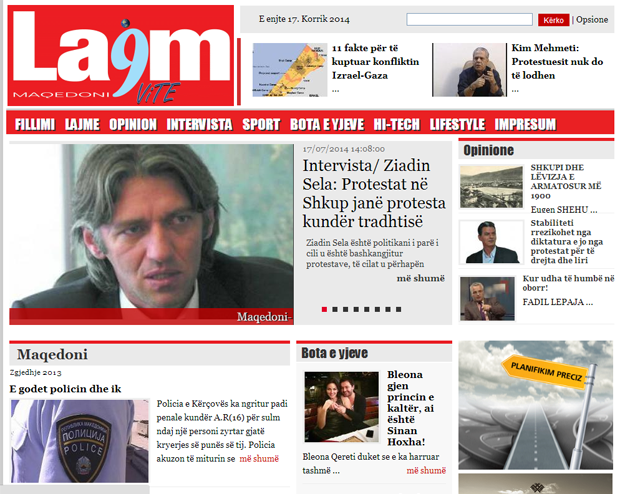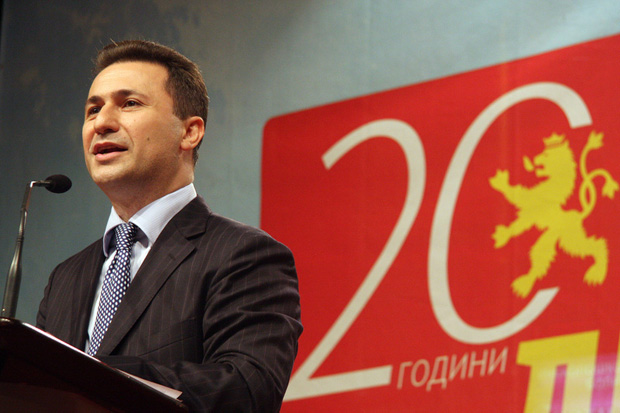15 Oct 2015 | Europe and Central Asia, Macedonia, Mapping Media Freedom, mobile, News

The successor nations to the former Yugoslavia are among the most difficult places for journalists to work in Europe, a fact borne out by the latest quarterly report from Index on Censorship’s Mapping Media Freedom project. In the case of Macedonia there have been 35 verified incidents since the project began in May 2014.
Journalists have been subjected to verbal threats, online trolling, intimidation and physical assaults against their person and property. But another issue afflicting Macedonia’s 200 media outlets is more insidious: government advertising budgets of €30-40 million that warp the market and act as a constraint on media outlets and journalists alike.
“The outlets compete in a small, distorted market, covering around 2 million citizens, where they cannot survive financially unless they align their interests with the governing parties and politically-connected large businesses,” according to November 2014 report from the Association of Journalists of Macedonia (ZNM) report.
Since 2009, when the European Commission Progress Report first criticised the use of government advertising as a tool “to undermine editorial independence”, media freedom in Macedonia has become more openly discussed.
According to a report published by the government, between 2012 and the end of the first quarter of 2014, ruling parties spent about €18 million on 27 government media campaigns. It spent €6.6 million in 2012, €7.2 million in 2013 and almost €4 million in the first six months of 2014. To date, the report was the only time that the government released information about public money spent on promotional or awareness-raising advertisements.
Most government-funded advertisements are aimed at informing citizens about the benefits of reforms, encouraging innovation and entrepreneurialism and promoting family values. In a statement on state ads, ZNM said: “Government campaigns have nothing to do with the public interest and are pure political propaganda of the government paid by public funds.”
“The government claims that campaigns are implemented in order to inform citizens about the importance and significance of specific policies and measures,” ZNM wrote. In effect, the organisation said, Macedonia’s government uses taxpayer money to tell citizens that its efforts have been successful, whether or not the reforms have actually succeeded.
After criticism from Brussels, the Macedonian government temporarily halted state-funded campaigns, and, as Balkan Insight reported, this will last “until the authorities agree on tighter rules for spending public funds on ads”. Unpaid public service announcements were not affected by the order.
The 2014 annual report examining the broadcast market from the Macedonian Agency for Audio and Audiovisual Media Services did not include a breakdown on government advertising spending, a departure from previous years. The 2012 report showed that the government had been the largest single source of ad budgets, outpacing telecommunication firms, Proctor & Gamble and Coca Cola. The government slipped to become the second largest advertiser, according to the .
A study conducted by ZNM examined the €18 million spent on advertising by the government since 2012. According to the report, the largest slice of the advertising buys were directed to pro-government media outlets “creating even more robust political-clientelistic and corrupt links between the government and the media”.
Another organisation, Media Integrity Matters, found that the government’s role in the advertising marketplace was deleterious. “These phenomena have prevented the media from performing their basic democratic role – to serve the public interest and citizens” the organisation wrote in its report, which recommended that media finances be transparent and monitored by independent bodies.
Mapping Media Freedom
Click on the bubbles to view reports or double-click to zoom in on specific regions. The full site can be accessed at https://mappingmediafreedom.org/
|
12 Sep 2014 | Macedonia, Mapping Media Freedom, News, Politics and Society

Index on Censorship and Osservatorio Balcani e Caucaso are joining forces to map the state of media freedom in Europe. With your participation, we are mapping the violations, threats and limitations that European media professionals, bloggers and citizen journalists face everyday. We are also collecting feedback on what would support journalists in such situations. Help protect media freedom and democracy by contributing to this crowd-sourcing effort.
Journalists have raised concerns over a new round of amendments to Macedonia’s Law on Audio and Audiovisual Media Services (LAAMS).
According to the Association of Journalists of Macedonia, the changes increase the role of the director of the Agency for Audio and Audiovisual Media Services in disciplining media. The government can now also subsidise up to 50% of domestic film production costs for private media.
“We find this problematic because it brings risk that the government will influence even more national media by using public funds to cause certain content to be produced and broadcast. In our opinion this should be banned. Obligatory domestic production should be reduced taking into account its financial implication on the media,” Dragan Sekulovski, executive director of the Association told Index on Censorship.
For its part, the agency claims that the law’s aim is to promote media freedom.
“The suspicion for censorship is ill-founded, since, according to the constitution of the Republic of Macedonia, censorship is forbidden,” Maja Damevska, spokesperson for the agency, told Radio Free Europe/Radio Liberty. “The regulatory body takes care only of proper implementation of the media legislation and therefore has never undertaken a measure or an action that can be considered censorship.”
More reports from Macedonia via mediafreedom.ushahidi.com
Macedonian Court does not recognise violation of the right to freedom of expression
Macedonian contributor attacked over contribution to Freedom House report
Police officer infringes journalist’s phone data privacy
Telma TV under government pressure
Police pressure journalists during protests in Skopje
This article was posted on Sept 12, 2014 at indexoncensorship.org
18 Jul 2014 | Macedonia, Mapping Media Freedom, News, Politics and Society

Besim Ibrahimi, intern for the Albanian-language newspaper Lajm, was arrested on Saturday, 5 July during a rally against the jailing of alleged extremist ethnic Albanian Muslims for the “terrorist” murders of ethnic Macedonians. The journalist was accused of taking part in the violent protests, while he was covering the rally under the instructions of his editor. Ibrahimi was released on Sunday, but the prosecutor has not yet decided if he will file charges against him or not.
“The policemen from the special units approached me and forced me to lie on the ground. When I told them that I am a journalist and I am here only to cover the protests, instead of releasing me, they beat me with batons and kicked me,” Besim Ibrahimi told Index few days after his prosecution.
“One of them told me ‘you’re not a journalist, you came here to protest’ and another was shouting ‘hit him, hit him’. And they just kept beating me until my glasses broke too. When they put me inside the vehicle, along with two other guys who were also treated inhumanely, they started using some hate language like ‘I will kill you Albanians’, ‘Albanian scum’”, he continued.
Ibrahimi spent 24 hours in the police station in Kisella Voda and was released on a promise to appear in court after a decision by the Court of Skopje. According to Ibrahimi, his case is currently under investigation and he aims to present evidence in order to withdraw the claim.
The Journalists’ Association of Macedonia, ZNM, strongly condemned the arrest of the young journalist and expressed its concerns “for establishing this extremely undemocratic practice in Macedonia of arresting journalists without having hard evidences.”
As Ibrahimi explained to Index, the Macedonian government controls almost the 90% of the media and the Albanian-language newspaper Lajm is targeted by the pro-government media. “They accuse us of fueling the protests. Albanians in Macedonia are facing state discrimination.”
The recent ethnic tensions in the country were raised when life sentences were handed down to six alleged Muslim radicals for the killing of five ethnic Macedonians at Orthodox Easter in 2012.
On Friday, July 4th thousands of protesters gathered outside the criminal court building in Skopje. According to media reports, the protests turned violent with the riot police firing tear gas, stun grenades and water cannon into the crowd and some protesters throwing bricks and rocks. Six people in total were detained and 20 police officers -as well as some protesters- were injured, the police reported.
Albanians make up a quarter of the country’s 2.1 million population.
More reports from Macedonia via mediafreedom.ushahidi.com
Police pressure journalists during protests in Skopje
Telma TV under government pressure
This article was posted on July 18, 2014 at www.indexoncensorship.org
19 Nov 2013 | Europe and Central Asia, Macedonia, News

The government of Prime Minister Nikola Gruevski has been heavily criticised for the state of media freedom in Macedonia (Image Toni Arsovski/Demotix)
Media freedom in Macedonia has been deteriorating for some time. The latest case is the arrest of Zoran Bozinovski, the owner of website critical of the government, Burevesnik on espionage charges. Below, Tamara Causidis, President of the Trade Union of Macedonian Journalists and Media Workers and Dragan Sekulovski, the Executive Director of Association of Journalists of Macedonia, chronicles the challenges facing the free press, in their submission to the upcoming International Federation of Journalists conference in Kiev.
—
The media business in Macedonia has been increasingly under attack over the past few years. The EU and the US State Department, as well as renowned non-governmental organisations like Freedom House and Reporters Without Borders, have all called attention to the decline of media freedom in the country. The challenges most often highlighted include imprisoned journalists, restrictive draft media laws, the government’s large advertising share, the lack of transparent ownership, and the polarisation of the media along lines of political and business affiliation. In light of this, freedom of the media and freedom of speech have been marginalised.
Macedonia has almost 200 media outlets, but unfortunately, that does not make the situation better. They all compete in a small, distorted market, covering just over 2 million citizens, where they cannot survive financially unless they align their interests with the governing parties and politically connected, large businesses. Apart from state media, the vast majority of the country’s press is in private hands. However, the government come out top among the 50 biggest advertisers in the country in 2012. The latest European Commission report raised this as a serious concern, and the DG Enlargement report of June says that at least 1% of the annual national budget (20 million Euros) is invested in media outlets through government campaigns and advertising. This highlights the authorities’ huge influence in the media sphere. Bearing in mind that there are no criteria for how to distribute these funds, “governmental friendly” media outlets are favoured over others. Professionals are fired and people with personal integrity are replaced by obedient mouthpieces, while a huge number of journalists are living in professional insecurity. Behind the veil of “economic reasons”, critical media is vanishing.
One of the most striking example of the situation Macedonian media finds itself in, took place on 24 December last year. Journalists reporting on the parliamentary session were expelled from Parliament by security forces without any reasonable explanation. The Association of Journalists of Macedonia (AJM) used all national legal measures to fight this, but so far no public official has been held liable for this breach of Article 16 of the constitution, which guarantees citizens the right to objective information. The next step would be submission of an appeal to the Court in Strasbourg.
In April the government announced a draft media law, now in its final stages within Parliament, which has the potential to further negatively affect media independence and freedom of expression. International and local organisations are concerned about the same issues regarding the bill – the intention to have one regulator for all types of media and the powerful role of this regulator, the issues concerning political independence, sustainable financing and high and disproportionate fines for the media, as well as the messy attempt to adopt definition of a journalist. The main Council of Europe, OSCE and AJM recommendations have not been accepted. In fact, the latest version of the law was updated with amendments which makes the text even more restrictive the before. For instance, it envisaged that authorities to decide which national association of journalists is legitimate, and will have the right to nominate a member to the council of the regulator and the public broadcaster.
In October 2013 Macedonia became the only country in south-east Europe with imprisoned journalists. Tomislav Kezarovski, from the daily Nova Makedonija, was sentenced to four and a half years in prison for in 2008 revealing the identity of a protected witness in a murder trial. The witness recently testified that he had given false evidence against the accused killers. The Trade Union of Macedonian Journalists and Media Workers (SSNM) and AJM organised two protests in front of court in Skopje, raising the issue in the international community, but despite this Kezarovski was sentenced on October 21.
It should also be noted that at the time, he was investigating the mysterious death of prominent journalist Nikola Mladenov, founder of the weekly Fokus and one of the biggest activists for press freedom in the country. AJM is taking daily initiatives to raise the visibility of this case, to try to convince authorities that this sends terrifying message to all journalists and endangers freedom of press even more.
Finally, many colleagues in the media cannot rely on any of the basic rights guaranteed by the Labour Law. They are working without contracts, insurance, paid vacation, overtime hours and sick leave, and minimum wage is not regulated. There aren’t any internal rules or statutes defining the rights and obligations of owners, editors and journalists, and there are instances of both direct and indirect bans for organising into workers unions. The journalists themselves are barely educated about what a union is and how they can organise through it. In the face of fierce criticism from AJM, the government has developed the Macedonian journalists association, designed not only to diminish critics and open confrontation but also to impose artificial support for the proposed media laws.
This text is drafted based on a draft report on the media situation in Macedonia by Tamara Causidis, President of the Trade Union of Macedonian Journalists and Media Workers and Dragan Sekulovski, Executive Director of Association of Journalists of Macedonia. It will be published at the upcoming conference organised by the International Federation of Journalists in Kiev.
This article was originally published on 19 Nov 2013 at indexoncensorship.org




